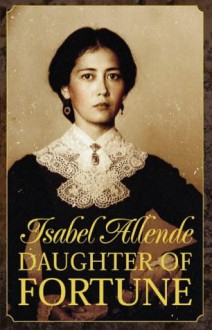Until Isabel Allende burst onto the scene with her 1985 debut, The House of the Spirits, Latin American fiction was, for the most part, a boys' club comprised of such heavy hitters as Gabriel García Márquez, Jorge Luis Borges, and Mario Vargas Llosa. But the Chilean Allende shouldered her way in...
show more
Until Isabel Allende burst onto the scene with her 1985 debut, The House of the Spirits, Latin American fiction was, for the most part, a boys' club comprised of such heavy hitters as Gabriel García Márquez, Jorge Luis Borges, and Mario Vargas Llosa. But the Chilean Allende shouldered her way in with her magical realist multigenerational tale of the Trueba family, followed it up with four more novels and a spate of non-fiction and has remained in a place of honour ever since. Her sixth work of fiction, Daughter of Fortune, shares some characteristics with her earlier works: The canvas is wide, the characters are multigenerational and multiethnic, and the protagonist is an unconventional woman who overcomes enormous obstacles to make her way in the world. Yet one cannot accuse Allende of telling the same story twice; set in the mid-1800s, this novel follows the fortunes of Eliza Sommers, Chilean by birth but adopted by a British spinster, Rose Sommers, and her bachelor brother, Jeremy, after she is abandoned on their doorstep. "You have English blood, like us", Miss Rose assured Eliza when she was old enough to understand. "Only someone from the British colony would have thought to leave you in a basket on the doorstep of the British Import and Export Company, Limited. I am sure they knew how good-hearted my brother Jeremy is and felt sure he would take you in. In those days I was longing to have a child and you fell into my arms, sent by God to be brought up in the solid principles of the Protestant faith and the English language." The family servant, Mama Fresia, has a different point of view, however: "You, English? Don't get any ideas, child. You have Indian hair, like mine." And certainly Eliza's almost mystical ability to recall all the events of her life would seem to stem more from the Indian than the Protestant side. As Eliza grows up, she becomes less tractable and when she falls in love with Joachin Andieta, a clerk in Jeremy's firm, her adoptive family is horrified. They are even more so when a now-pregnant Eliza follows her lover to California where he has gone to make his fortune in the 1849 goldrush. Along the way Eliza meets Tao Chi'en, a Chinese doctor who saves her life and becomes her closest friend. What starts out as a search for a lost love becomes, over time, the discovery of self; and by the time Eliza finally catches up with the elusive Joachin, she is no longer sure she still wants what she once wished for. Allende peoples her novel with a host of colourful secondary characters. She even takes the narrative as far afield as China, providing an intimate portrait of Tao Chi'en's past before returning to 19th-century San Francisco, where he and Eliza eventually end up. Readers with a taste for the epic, the picaresque and romance that is satisfyingly complex will find them all in Daughter of Fortune.--Margaret Prior, Amazon.com
show less






 6 years ago
6 years ago